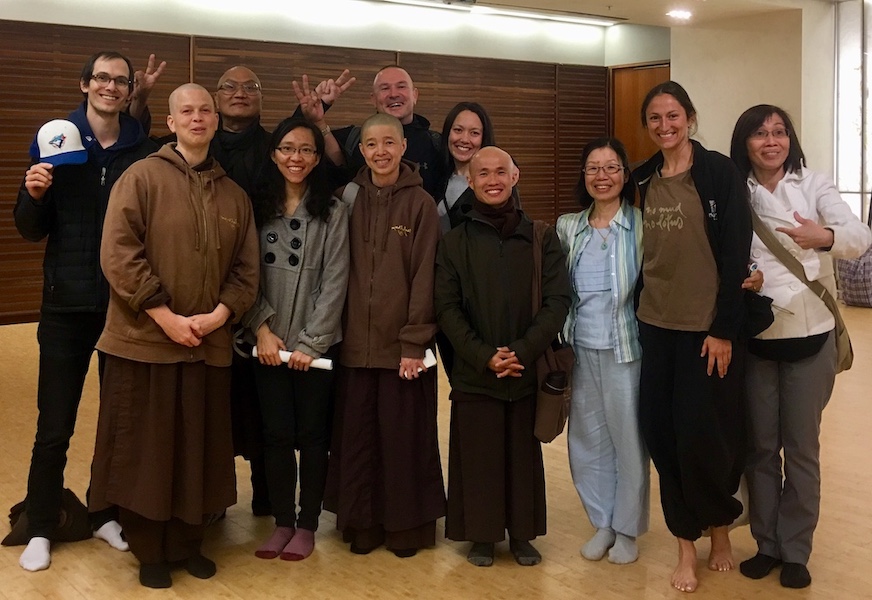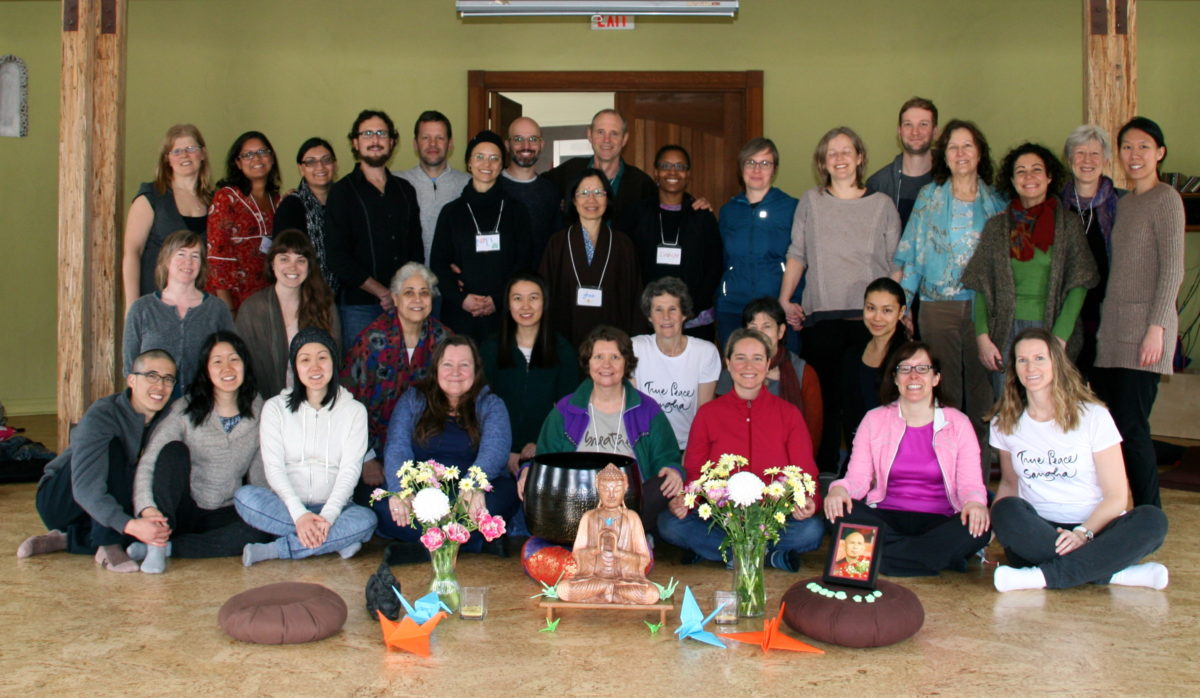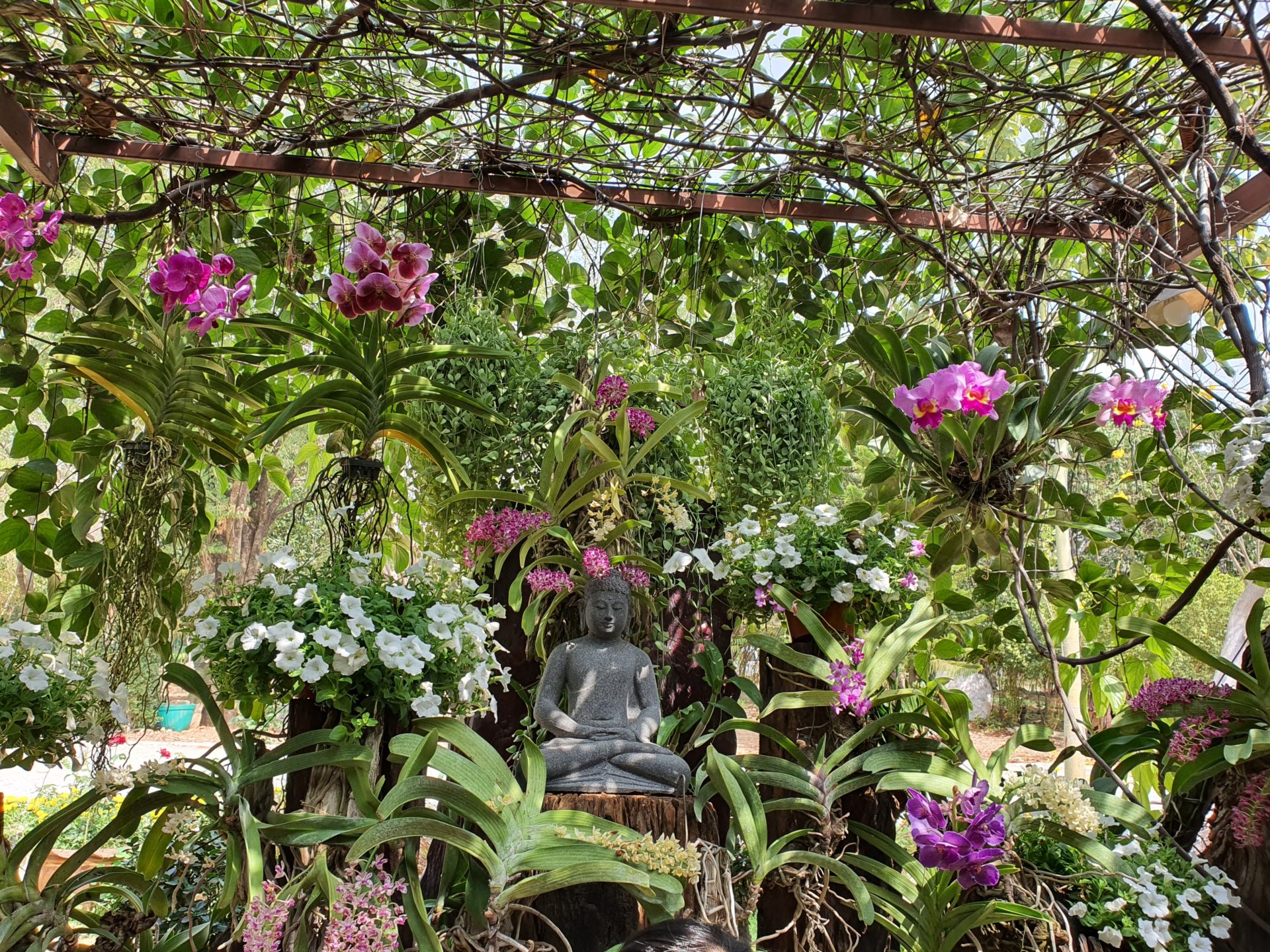Practice in a Time of Pandemic
By True Peace Toronto Sangha

Coronavirus is an economic catastrophe, a godsend for the environment, the end of the world order as we know it, and for a student of mindfulness, an opportunity to practice—not to mention a deep teaching on interbeing, impermanence, and the First Noble Truth.
Practice in a Time of Pandemic
By True Peace Toronto Sangha

Coronavirus is an economic catastrophe, a godsend for the environment, the end of the world order as we know it, and for a student of mindfulness, an opportunity to practice—not to mention a deep teaching on interbeing, impermanence, and the First Noble Truth.
At a time when we need our Sangha more than ever, we must stay home and cancel our regular sittings, special events, and retreats. Like many Sanghas around the world, True Peace Sangha now meets online. As the teaching of nondualism would lead us to expect, this has both positive and negative aspects. We are sad not to see our Sangha family in person, but people who live too far away to join our usual meetings now appear on our screens each week. Smaller Dharma sharing groups make it easier for everyone to take plenty of time to explore and share what is in their hearts. Technology allows us to easily incorporate Dharma talks and beautiful music into our online sessions. Individual members of the True Peace Sangha and its satellite Sangha in Cavan, a small town 120 miles northeast of Toronto, continue to meet online and offer one another compassion and support. There is plenty of mud, but there are quite a few lotuses too.
For many, the current crisis only heightens concerns about the world we are co-creating with its ever-worsening climate crisis and staggering inequality. Yet it shows us, as never before, the power and necessity of our practice.
Bell of Mindfulness
For some, the self-isolation necessitated by the coronavirus has been like an enforced retreat. For Yishin Khoo, a longtime member of True Peace Sangha, it came just days after a near-death experience. She narrowly escaped a serious collision during a trip to China in January. Still deeply shaken, she boarded the plane for her return flight to find everyone wearing a mask. Suddenly, impermanence was not a theory.
Back in Canada and in self-quarantine, she had plenty of time to reflect on the stories of people dying of the virus in China; at that time, there were no known cases in Canada. One tale stuck with her: a woman who stared at her cell phone until the moment she stopped breathing. Yishin said, “I don’t want to be like that. I realised if I die tomorrow, I do not want to be attached to unimportant things and get caught in worries and anxiety.” While in the past she had sometimes struggled to make time for her practice, it now felt urgent.
Aspects of Thay’s teachings that had seemed abstract were now clear to Yishin. She shared, “Thay’s teachings on the connections between joy and suffering had always seemed a bit confusing, but it became obvious to me that suffering is always there. Impermanence is always there. It’s not theoretical. It’s a matter of being in touch with reality. I am dealing more diligently with how to generate joy and peace in the midst of suffering and how to suffer artfully.”
Seeing the Whole
Ghan Chee founded True Peace Sangha in 2001 and, along with her husband David Frank, has offered support and guidance to members ever since. In 2008, they moved to the small town of Cavan and founded a sister Sangha there. Together they have hosted a monthly Day of Mindfulness for all True Peace Sangha facilitators, offering guidance for their practice.
Reflecting on this moment, Ghan said, “Our way of life leads us to see things from a very limited perspective. When we have a solid foundation, we can enlarge the context and get closer to truth. The virus gives us the opportunity to see the big picture. It shows us that the air, water, space, and oxygen don’t have national boundaries. What happens to a poor person in a ghetto halfway around the world will come to us. In caring for them we are caring for ourselves.”
Ghan pointed out that fear keeps us locked in our small context, but this crisis offers the possibility—indeed the necessity—of changing our views. “In a system where we only value profit, human beings are tools.” Systemic change often appears impossible, but in fact incredible changes have been brought about by small numbers of people who are able to act from stability and insight. “One person can bring about tremendous change. If we follow our deepest values and act from a place of love and not anger, our actions will be effective.”

Touching the Earth
“From an ecological perspective, the pandemic will be an awakening to some and terrifying to others,” according to James Wilkes, who teaches in the Indigenous Environmental Studies and Sciences Program at Trent University. “It’s an invitation to see the virus as a sign of an ecological crisis, rooted in our environmental destruction. The situation is revealing problems with the way we think individually and with how our societies operate.”
Yet James is aware of the risk of becoming overwhelmed as we face the task in front of us. From childhood, he always found happiness and peace in the natural world, but during his undergraduate years in environmental studies, he saw many classmates lose their drive and become weighed down by anxiety and despair. Thay’s teachings helped James reconnect with the delight and wonder that drew him to environmental work. “How do we inspire others when we are overwhelmed? If we can bring joy to the work, we can be healed by it. If we bring despair, we will burn out.”
For James, that meant moving from the abstract notion of fighting ecological calamity to concrete tasks around the restoration of a specific place. This meant getting his hands dirty and falling in love with Mother Earth again. In his work with Community Voices for Manoomin, a community-based advocacy group that brings together Indigenous people and settlers supporting manoomin (wild rice) and its harvesting, James has found healing in caring for the Earth, for himself, and for all manner of living beings.
Comfortable with Uncertainty
Before the virus, Kobi Rivlin was a bit of a retreat junkie. “I loved retreats. I know it’s hard to maintain the same level of practice when you go home, but the memory of doing things differently is very powerful.” He hopes the same may be true of the pandemic lockdown. “People are experiencing a drastic change in how they live. They may find they can be happy without things they believed essential before: their office or car, for starters. For many of us, the changes have meant we have more time. What are we going to use that for? To practice or to catch up on Netflix?”
The pandemic has been a deep teaching on living with uncertainty. Kobi shared, “I don’t know. The doctors don’t know. None of the specialists really know. People spend so much time speculating. Maybe it is better to find a way to be okay with the uncertainty. Recognizing how difficult this is for everyone, I find it’s essential to be gentle and kind, and to take good care of myself and those I interact with. I feel that judging myself or others, expecting perfection, will backfire.”
We also have an opportunity to think about how we engage with our work. Thay’s teachings helped Kobi stop seeking work-life balance, which is rooted in a view that work is not part of our life. “I practice looking at work tasks and interactions with co-workers as invitations for practice. People often think of themselves as helpless and powerless at work. I see a huge parallel between the way we view work and behave at work and how we interact with the climate. We often view the workplace as a reality we cannot change. We tell ourselves that the power to change things is in someone else’s hands. When I accept this as reality, I am co-creating a toxic environment that hurts us all and makes me feel stressed and anxious. When I recognize I am a co-creator of the work environment, culture, and priorities, I find ways to practice with them, transform them, and feel connection, compassion, and care.”
Thay says we’re here to awaken from our illusion of separateness. The pandemic can be seen as a wake-up call to remember how our health and well-being are tightly connected to the health and well-being of everything around us.
Ann Dugan, Boundless Love of the Heart, is a member of True Peace Toronto. She interviewed the following Sangha members for this article: Yishin Khoo, Great Awakened Healer of the Heart; Ghan Chee, True Silent Wonder; James Wilkes, Courageous Earth Protector of the Heart; and Kobi Rivlin, Refreshing Joy of the Heart.

